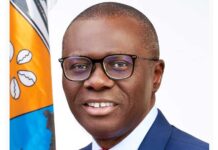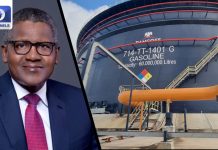The proposed strike action by the Nigerian Labour Congress (NLC) and the Trade Union Congress (TUC) has been suspended following a meeting between the Federal Government and labour leaders.
According to Mr Ayuba Wabba, the NLC President, both the government and organised labour have looked into the issue of fuel price hike and what was needed to be put in place in order to address the issue of the increase.
Mr Wabba said:
“We have discussed the state of our refineries and how to achieve sustainable refineries. We have also looked at the issue of the tariff hike and other challenges.
“We agreed to suspend the strike, and we agreed to also put a committee in place to work out a lasting solution in addressing these challenges, including the issue of metering and importantly also is to bring about the issue of efficiency.
“We also reviewed the process of privatisation and other issues such as clear palliatives that were needed to be extended to our members and Nigerians to cushion the effect of these policies.”
Below is a Full Communique from the meeting:
JOINT COMMUNIQUE ON THE RESOLUTION OF TRADE DISPUTE BETWEEN THE FEDERAL GOVERNMENT OF NIGERIA (FGN) AND THE ORGANIZED LABOUR REPRESENTED BY THE NIGERIA LABOUR CONGRESS (NLC) AND THE TRADE UNION CONGRESS (TUC) HELD AT THE STATE HOUSE BANQUET HALL ON SUNDAY, 27TH SEPTEMBER 2020
A Bipartite Meeting between the FGN and the two Labour Centres – Nigeria Labour Congress (NLC) and Trade Union Congress of Nigeria (TUC),
Having been convened at the Banquet Hall, State House, Abuja to discuss emerging labour issues arising from recent cost-reflective Electricity Tariff adjustments and deregulation of the downstream sector of the Petroleum Industry,
Recognizing the public outcry and protest over the recent Federal Government twin policies on Electricity Tariff Reform and full implementation of deregulation of the downstream sector of the Nigerian Oil and Gas Industry resulting in the planned nationwide industrial action by Organised Labour,
Bearing in mind the spiral and negative impact of COVID-19 pandemic on the world economy,
Further bearing in mind that due to the impact of COVID-19 pandemic the world is undergoing a socio-economic transition which has affected price stability, the sustainability of enterprises, employment, and other socio-economic indices,
Acknowledging that the spiral and negative impact of COVID-19 pandemic on the global economy has given rise to the need for a new socio-economic order,
Recognising the need to sustain enterprises for retention and creation of jobs as well as sustainable growth and development,
Acknowledging the need for social concertation between the Federal Government and workers’ representatives, namely the two Labour Centres – The NLC and TUC,
To aid in the dialogue and communication, the Federal Government side made presentations to show the state of the economy and the drive behind the recent cost-reflective Electricity Tariff adjustments and deregulation of the downstream sector of the Petroleum Industry,
Bipartite meeting to address and resolve the issues in dispute between the FG and Labour Centres was held on September 15, 24, and 27, 2020,
After exhaustive deliberations on the issues raised by Labour Centres, the FGN stated that it has fashioned out palliatives that would ameliorate the sufferings that Nigerian workers may experience as a result of the cost-reflective Electricity Tariff adjustments and deregulation of the downstream sector of the Petroleum Industry.
The palliatives will be in the areas of transport, power, housing, agriculture and humanitarian support.
After thorough debates and negotiations on various issues raised by all parties, the following resolutions were reached and mutually adopted:
ELECTRICITY TARIFF REFORMS
The parties agreed to set up a Technical Committee comprising Ministries, Departments, Agencies, NLC and TUC, which will work for a duration of two (2) weeks effective Monday 28th September 2020, to examine:
the justifications for the new policy in view of the need for the validation of the basis for the new cost-reflective tariff as a result of the conflicting information from the fields which appeared different from the data presented to justify the new policy by NERC;
metering deployment, challenges, the timeline for massive rollout.
The Technical Committee membership is as follows:
Mr Festus Keyamo, SAN – Hon. Minister of State Labour & Employment – Chairman
Mr Godwin Jedy-Agba – Hon. Minister of State Power – Member
Prof. James Momoh – Chairman National Electricity Regulatory Commission – Member
Engr. Ahmad Rufai Zakari – SA to Mr President on Infrastructure – Member/Secretary
Dr. Onoho’Omhen Ebhohimhen – Member (NLC)
Comrade Joe Ajaero – Member (NLC)
Comrade Chris Okonkwo – Member (TUC)
1no. A representative of DISCOS – Member
The Terms of Reference (ToR) are as follows:
To examine the justification for the new policy on cost-reflective Electricity Tariff adjustments.
To look at the different Electricity Distribution Company (DISCOs) and their different electricity tariff vis-à-vis NERC order and mandate.
Examine and advise Government on the issues that have hindered the deployment of the six million meters.
To look into the NERC Act under review with a view to expanding its representation to include organized labour.
The Technical subcommittee is to submit its report within two (2) weeks. During the two weeks, the DISCOs shall suspend the application of the cost-reflective Electricity Tariff adjustments.
The meeting also resolved that the following issues of concern to Labour should be treated as “stand-alone” items:
The 40% stake of Government in the DISCO and the stake of workers to be reflected in the composition of the DISCO’s Boards.
An all-inclusive and independent review of the power sector operations as provided in the privatization MOU to be undertaken before the end of the year 2020, with Labour represented.
That going forward, the moribund National Labour Advisory Council (NLAC) be inaugurated before the end of the year 2020 to institutionalize the process of tripartism and socio dialogue on socio-economic and major labour matters to forestall a crisis
DOWNSTREAM SECTOR DEREGULATION
Consequent upon the critical review of the various challenges of the downstream sector of the Nigeria oil and gas industry vis a vis the incalculable losses associated with a subsidy regime the Country has been incurring in terms of, stifled growth in the downstream sector, diminished human capital development and massive financial leakages and flight. This is in addition to the dire financial circumstances of the Federation that precludes any ability to sustain any subsidy on PMS and making deregulation of PMS inevitable. Consequently, the Parties agreed to the following:
All parties agreed on the urgency for increasing the local refining capacity of the nation to reduce the overdependence on the importation of petroleum products to ensure energy security, reduce the cost of finished products, increase employment and business opportunities for Nigerians.
To address (1) above, NNPC to expedite the rehabilitation of the nation’s four refineries located in Port Harcourt, Warri and Kaduna and to achieve 50% completion for Port Harcourt by December 2021, while timelines and delivery for Warri and Kaduna will be established by the inclusive Steering Committee.
To ensure Commitment and transparency to the processes and timelines of the rehabilitation exercise, the management of NNPC has offered to integrate the national leadership of the Nigeria Union of Petroleum and Natural Gas Workers (NUPENG) and Petroleum and Natural Gas Senior Staff Association (PENGASSAN) into the Steering Committee already established by the Corporation.
A Validation team comprising the representatives of the NNPC, Nigeria Extractive Industries Transparency Initiative (NEITI), Infrastructure Concession Regulatory Commission (ICRC), NUPENG and PENGASSAN will be established to monitor the progress of the rehabilitation of the refineries and the pipelines/strategic depots network and advice the Steering Committee periodically.
Post rehabilitation, NNPC shall involve the PENGASSAN and NUPENG in the process of establishing the operational model of the Nation’s refineries.
The Federal Government will facilitate the delivery of licensed modular and regular refineries, the involvement of upstream companies in petroleum refining and establishing a framework for financing in the downstream sector.
NNPC to expedite work on the Build Operate and Transfer framework for the nation’s pipelines and strategic depots network for efficient transportation and distribution of Petroleum products to match the delivery timelines of the refineries as agreed.
The Federal Government and its agencies to ensure delivery of 1 million CNG/LPG AutoGas conversion kits, storage skids and dispensing units under the Nigeria Gas Expansion Programme by December 2021 to enable delivery of cheaper transportation and power fuel. A Governance Structure that will include representatives of organized Labour shall be established for timely delivery.
GENERAL INTERVENTION
To cushion the impacts of the downstream sector deregulation and tariffs adjustment in the power sector, the Federal Government will implement the following:
A specific amount to be unveiled by the FGN in two weeks’ time will be isolated from the Economic Sustainability Programme Intervention Fund and be accessed by Nigerian Workers with subsequent provision for 240,000 under the auspices of NLC and TUC for participation in agricultural ventures through the CBN and the Ministry of Agriculture. The timeline will be fixed at the next meeting.
Federal Government will facilitate the removal of tax on minimum wage as a way of cushioning the impacts of the policy on the lowest vulnerable.
Federal Government will make available to organized labour 133 CNG/LPG driven mass transit buses immediately and provide to the major cities across the country on a scale-up basis thereafter to all States and Local Governments before December 2021.
Housing: 10% be allocated to Nigerian workers under the ongoing Ministry of Housing and Finance initiative through the NLC and TUC.
Consequently, the NLC and TUC agreed to suspend the planned industrial action.






